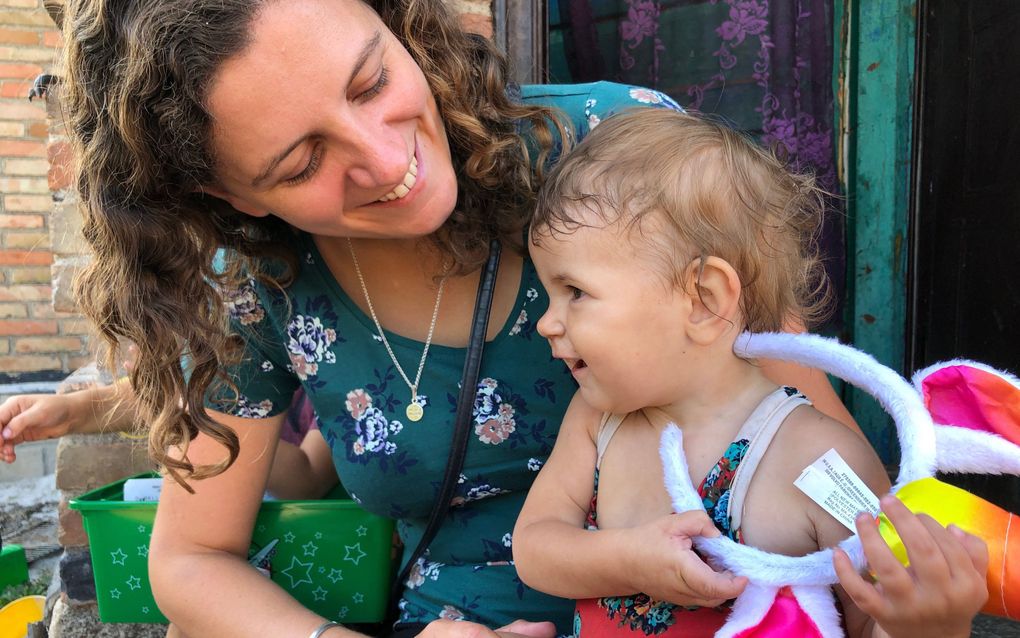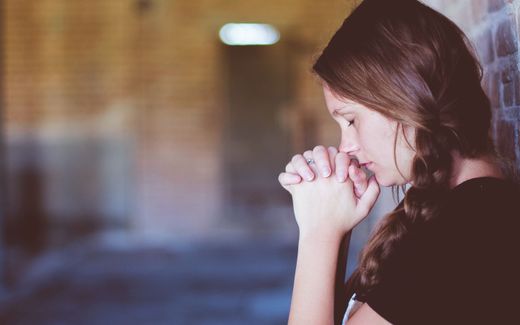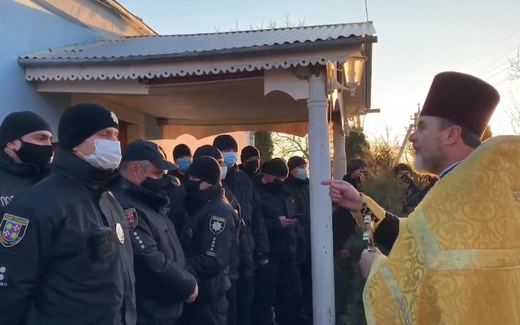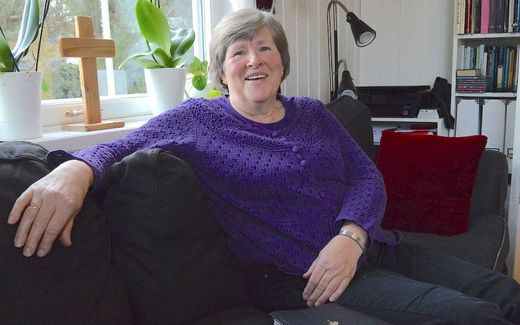Face to face with distressing poverty in Ukraine
31-12-2021
Christian Life
Chris Klaasse, RD

Photo RD
Christian Life
Stefanie de Wildt (29) lives in one of the poorest regions of Ukraine. The 29-year-old lady from the Netherlands works on behalf of the Dutch Christian missionary organisation Kimon for a family of ten children, seven of whom are foster children. De Wildt regularly visits the poorest in the region and encounters distressing situations there. Yet, she prefers Ukraine to the Netherlands. “That Western prosperity, it really does not make you happy.”
Vast fields of sunflowers brighten up the rolling landscape of the Ukrainian Kirovograd province. This region is somewhat desolate in the middle of the Eastern European country. The landscape is monotonous regardless of the sunflowers, with only a few trees and hardly any houses.
Stefanie de Wildt
Stefanie de Wildt (1992) grew up in the Dutch village of Oud-Alblas, as the youngest of six children. After secondary education at Wartburg College, she studied to become a nutrition assistant. In that position, she worked for two years at the Erasmus MC Sophia Children’s Hospital in Rotterdam. After that, she started working as a host parent.
In 2017 she quit her job and went to Ukraine. First, she lived for two years in Beregowo, in the far West; now, two and a half years in Pomichna. Since the beginning of 2020, she has been working on behalf of the Kimon Foundation. The Kimon Foundation is a Christian missionary organisation focussing on distressed children worldwide.
De Wildt is both a member of the Reformed Congregation in Alblasserdam and of the Baptist congregation in Pomichna.
Stefanie de Wildt lives in this area, in the town of Pomichna. Officially it is a city, but it feels like a big village. Apart from a single apartment complex, there are no tall buildings. There is also little motorised traffic, and the cars driving there are almost exclusively Soviet-era Ladas.
The infrastructure is terrible. The main roads are full of potholes; the minor streets consist of round cobblestones and sand. There is a church on one of these streets. The building looks new. The high walls are made of yellow-orange stones, the roof of red tiles. The building belongs to the local congregation of Evangelical Christian Baptists.

On the church site are two other buildings that are also owned by the Baptist congregation. One is a former kindergarten severely damaged by the ravages of time; the other is a large and well-maintained house. The Ukrainian couple Andrey and Alona Vovk live there with three children of their own and seven foster children.
Preparing the borsch
It is the end of August, the last week of the summer holidays. All the children are home, so “the family home” is very busy. One foster daughter teaches herself to play the piano; another is busy with crayons. An energetic boy is running after a ball, and a fourth kid is engaged with a jigsaw puzzle.
Stefanie de Wildt is standing at the counter in the open kitchen. Today, she is cooking a well-known regional dish: borsch. “Andrey and Alona are today at Kropyvnytsky, the big city, at an hour and a half drive from here. That’s why I have to make the food on my own this time,” she explains.
When the beetroot soup is ready and simmering on the stove, she sits down at the table.

How does a young woman from a rural region in the Netherlands end up in Ukraine?
“I feel called to serve here. As a child, I had a desire to take care of poor children. When I was fourteen, I experienced a personal calling from Proverbs 31. In it, Solomon speaks of a virtuous woman. He says in verse 20: “She stretches out her palm to the afflicted one, and she stretches out her hands to the needy.” I felt that the Lord spoke and that He would have me to stretch out my hands to help the needy. At the time, I kept quiet about it because I was afraid that I would immediately have to put that calling into action.
Six years ago, that verse from Proverbs kept coming back to my mind. Then I felt I had to respond to this calling.”
How did you do that?
“I didn’t want to live in another country, so far from my family. That is why I first tried to answer that call with a working holiday to South Africa. But the calling remained. I made another attempt, with a working holiday to Ukraine.
We took care of children in a hospital in Beregowo, a town near the border with Hungary. Those children conquered my heart.”
One day someone asked me, “Why don’t you stay here?” That question got me thinking. For a week, I hardly slept and kept praying that the Lord would clarify my questions. One night, I read in the Bible about Jacob wrestling with God and saying, “I will not let you go unless You bless me.” Then I realised: I can only stay here with the blessing of the Lord.
In the days that followed, that text from Genesis 32 kept coming back. That was a confirmation for me. During the working holiday, I called my parents to tell them that I was going to live in Ukraine.”
How did they react?
“They expected it. When I later told other people about my plans, they also often responded: “We already knew that.” In the weeks before I decided, I had emailed family and friends about my experiences. In those emails, they tasted how much I had come to love those children.”
In April 2017, you moved to Beregowo to work in the hospital. How was that?
“I did volunteer work in a ward where foundlings and children evicted from home were kept. Babies whose mothers simply dropped off were there as well. The parents often had no money to feed their children and thought: at least they get free food in the hospital, so we’ll take them there. They did not think that a child could not do without a mother’s love.

The hospital paid no attention to the children. They fed them and left them in their beds. That’s why they did not develop. Their muscles were flaccid because they were not using them. They could not talk because nobody said anything to them. So, there were plenty of skinny, disabled, uneducated children. I saw it as my job to give them love and attention.
Through those children, I also came to other places. Caring for a severely handicapped gipsy girl, I went to the gipsy camp, where I also helped other Roma. And through children who were transferred to a children’s home, I’ve been to several of those homes.”
Why don’t you work there anymore?
“After two years, that department was abolished because the Ukrainian government had amended the legislation. Children who were not ill were no longer allowed to go to the hospital. They immediately had to go to a children’s home. So, my work there ended, but then I knew: one day, I wanted to start a shelter for disabled children myself. I still have that wish.”
How did you end up in Pomichna?
“In those first two years, I got to know all kinds of people through the church. Also, an elderly couple who meant a lot to me. My Ukrainian parents, I call them. Their daughter and son-in-law, Alona and Andrey Vovk, were asked by the church in Pomichna to start a family home with foster children. A German Christian organisation had sponsored a house, looking for people to live in it. That’s what they’re going to do. They asked me if I wanted to help them with that. That’s how I ended up here.”
Offering help where possible
Tuesday afternoon, half-past three. De Wildt drives to the other side of town by car. She is on her way to one of the troubled families she visits regularly. Families are living in extreme poverty and under child protection supervision. “The church is in contact with the Pomichna Child Protection Agency, and we offer help to those families where possible.”

“Here it is.” De Wildt parks the car next to a dilapidated house. “A woman lives here with six children. There is no father because the children were probably all fathered by another man. Their mother drinks a lot and regularly wanders through the village drunk. And apparently, she sometimes goes into bed somewhere.”
The house has a paintless door. There are two crumbled concrete steps in front. On it are three timid boys. On the sidewalk in front of them is an old buggy with a toddler in it. The girl is wearing an old diaper and a smeared shirt. De Wildt takes the child out of her cart and greets the boys. Their large eyes, looking darkly at the world, begin to shine.
The oldest child now also comes out through the front door, a fourteen-year-old boy who has difficulty moving and speaking. He clarifies that visitors are not allowed to enter because it has not been cleaned up inside. “His mother probably told them not to let anyone in. Out of shame.”
Since the beginning of the morning, the children have been left to their own devices because their mother is not at home. De Wildt is curious about where she is. She has the eldest son, who owns a telephone, call his mother. The woman turns out to be in a nearby village but is on her way home. She is walking because the family has no means of transport.
The garden is a wasteland. Among the withered weeds lies a great deal of junk: an empty soda bottle, pieces of plastic that were once toys, crumpled paper. In the grass lies a naked doll. Her legs turned behind the back. She stares blankly upwards. The thing speaks wordlessly of dull misery. And of impotence. The doll is part of the family, it seems.

It’s the last week of the summer vacation. Next week, the eldest two boys have to go back to the public school in the village. “They still need decent clothes and school supplies for that. I want to buy it for them tomorrow,” says De Wildt. “I want to ask their mother what exactly is needed.” And so, we have to wait for the mother’s return.
Shoeboxes with toys are in the trunk of De Wildt’s car. The American organisation Samaritan’s Purse has sent it to the Baptist congregation to distribute to these families. The oldest boys help to lift the packages from the car. When the boxes open, there are screams of joy. Moments later, the oldest blows up a beach ball, and the youngest boy is colouring.
Sascha, the second oldest, has a ball. He throws it against the wall. The bright ten-year-old boy visibly enjoys the visit. He chats endlessly with De Wildt. He speaks Ukrainian; she responds in Russian. The two languages are very similar. Most older people speak Russian, the language spoken in Ukraine until 1991 because the country was part of the Soviet Union until that year.

“When I was here for three months, I took language lessons. With a woman who only spoke Russian,” says De Wildt, who speaks the foreign language almost fluently. “But that was only twice a week, and it didn’t make much progress. Because I visited old, lonely grandmothers, things went a little faster. Yet I still understood little of it, and I could hardly speak it myself. I didn’t get the hang of it until I moved into the family home. In such a family, you learn it naturally.”
At a quarter to six, the mother of the lonely children comes home. The tired woman walks through the rusted gate in the garden fence. The enthusiastic Sascha rushes up to her to show his latest acquisitions. When he demonstrates how high he can throw his new ball, his mother thinks he is too busy. She starts talking to him in a loud voice and sends him inside. In the lively eyes, the sadness returns.
“Sascha and his older brother are such sweet boys. They feel very responsible for their brothers and sister and each other. They want to make the best of the situation,” says De Wildt when we are back in the car. She drives to the home of Baptist minister Pavel Shapoval and his wife. They invited her over for dinner.
Extensive three-course menu
The tiny house of the Shapovals smells lovely. There is a set table in the room next to the kitchen. Those present stand behind their chairs, after which the pastor says a prayer in Russian. This is followed by an extensive three-course menu. No expense has been spared to spoil the guests. “This is typically Ukrainian,” says De Wildt. “People have almost no money, but they are not economical with guests. The sausage on that dish is very expensive. I think they borrowed money for this food somewhere.”
Was it not difficult, getting used to that poverty?
“Yes, very much. I have seen harrowing situations. For example, a family living in one drafty room and only one bed.
It was very good for me to be confronted with that. In the Netherlands, I bought everything I wanted. I have now learned not to do that. The supply is also less here. If you want to buy a blouse, you can be happy if they have one in your size.

I would not want to go back to the prosperity of the Netherlands. That really does not make a person happy. Here, I see how happy people are when they can get what they need. The Christians here live very strongly, realising that they get everything from God’s hand. And if something is not there, they patiently adapt to it.”
What do you still want to do in Ukraine?
“I would like to take in disabled children on a small scale in the old school next to the church, such as in the family home where I now live. It still has to be refurbished or even tossed down and rebuilt. This plan has been around for some time, but it remained on the shelf due to corona and setbacks in the family home. We also need a lot of money.
How it will turn out in the end, only the Lord knows. The same applies to this enormous project: if it does not have His blessing, then it does not need to be for me.”
This article was translated by CNE.news and previously published in Dutch daily Reformatorisch Dagblad on November 9th, 2021.
Related Articles





